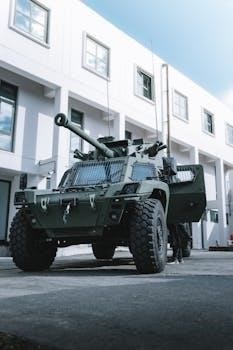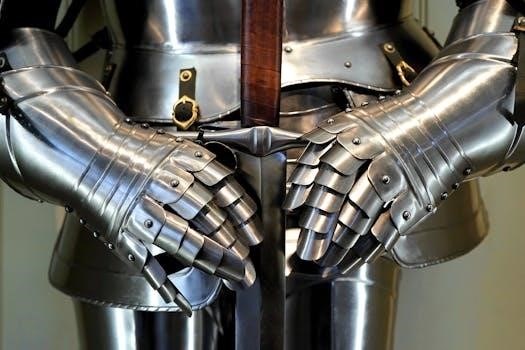An armor bearer’s role‚ deeply rooted in biblical scripture‚ involves providing crucial support to leaders. This position‚ more than carrying weapons‚ encompasses diverse responsibilities‚ ensuring the leader’s well-being and effectiveness.
Biblical Roots of Armor Bearers
The concept of armor bearers finds its origins in the Old Testament‚ where these individuals served as trusted aides to kings and military leaders. Passages‚ such as Judges 9⁚54 and 1 Samuel 14⁚7‚ highlight their presence. Their duties extended beyond merely carrying physical armor; they were integral to the leader’s effectiveness. The Hebrew word “nacah” sometimes used to describe their role translates to “lift‚” “raise‚” or “hold up‚” signifying their supportive function. They stood beside their leaders in battle‚ offering not just physical assistance but also encouragement‚ embodying a crucial role of loyalty and service. The biblical examples of armor bearers like Naharai underscore the importance of their position. They were an essential part of the leadership structure‚ demonstrating the significance of support roles in achieving success.

Core Responsibilities of an Armor Bearer
Armor bearers are entrusted with essential duties‚ including carrying equipment‚ providing physical support‚ and offering crucial encouragement. These actions are fundamental to the leader’s success.
Carrying and Maintaining Equipment
Historically‚ an armor bearer’s primary duty involved the physical handling of a leader’s armor and weaponry. This responsibility extended beyond mere transportation; it included meticulous maintenance to ensure all equipment was battle-ready. This meant keeping weapons sharp‚ armor polished‚ and all gear in optimal condition. They were responsible for the upkeep and readiness of everything from swords and shields to helmets and spears. The armor bearer’s role was crucial in ensuring that the leader was fully equipped and prepared for any situation‚ whether in battle or during ceremonial events. This meticulous attention to detail was vital for the safety and effectiveness of their leader.
Providing Physical Support and Protection
Beyond equipment‚ an armor bearer provided direct physical support and protection. They were often positioned close to their leader‚ acting as a bodyguard. This meant being ready to defend against attacks and ensure the leader’s safety in dangerous situations. They might assist the leader in mounting a horse‚ navigate difficult terrain‚ or even finish off wounded enemies. Their physical presence was a constant source of security‚ allowing the leader to focus on their duties without fear. This also included immediate support during conflicts‚ placing themselves between the leader and danger‚ demonstrating unwavering loyalty and courage.
Offering Emotional Support and Encouragement
The role of an armor bearer extended beyond the physical; they also offered crucial emotional support and encouragement. They were a confidant‚ a trusted companion who understood the pressures and challenges faced by the leader. In times of stress or discouragement‚ the armor bearer would provide a listening ear‚ offer words of comfort‚ and remind the leader of their strengths and purpose. This emotional support helped to maintain the leader’s morale and focus‚ enabling them to continue leading effectively. This also involved offering encouragement‚ bolstering their leader’s spirit and helping them face any difficulties.
Beyond the Physical⁚ Spiritual Duties
Armor bearers had spiritual responsibilities‚ which included intercessory prayer and supporting the leader’s vision. These duties were crucial for the leader’s overall well-being and effectiveness.
Intercessory Prayer for the Leader
The role of an armor bearer extends beyond mere physical support; it includes the vital duty of intercessory prayer. This involves actively seeking God’s intervention and guidance on behalf of the leader they serve. Engaging in fervent prayer‚ armor bearers become spiritual warriors‚ fighting battles in the heavenly realm for their leader’s protection‚ wisdom‚ and strength. This spiritual support is essential‚ ensuring the leader remains aligned with God’s will and can effectively carry out their calling. The prayers of an armor bearer provide a shield against spiritual attacks and foster an environment of divine favor and guidance for the leader.
Supporting the Leader’s Vision
An armor bearer’s role is deeply intertwined with supporting and advancing their leader’s vision. This involves understanding the leader’s goals and passionately working towards their achievement. This support includes providing practical assistance‚ offering encouragement‚ and ensuring that the leader remains focused on the mission. An armor bearer becomes an advocate for the leader’s vision‚ helping to communicate it effectively and rallying others to participate; They work diligently to remove obstacles‚ enabling the leader to pursue the vision without unnecessary hindrance. By aligning their efforts with the leader’s goals‚ armor bearers actively contribute to the success of the shared mission.

Armor Bearers in Different Contexts
The role of an armor bearer adapts across various settings‚ from military to religious contexts. The core principles of support and loyalty‚ however‚ remain consistent.
Armor Bearers in Military Settings
In military contexts‚ armor bearers were vital for a leader’s readiness and protection. They assisted with the application and maintenance of heavy armor‚ ensuring the leader was properly equipped for battle. Furthermore‚ they carried extra weapons‚ providing immediate access during combat. Armor bearers were also responsible for finishing off enemies wounded by their leaders‚ demonstrating their active participation in conflict. They stood beside their leaders in the front lines‚ offering both physical support and a sense of courage. These roles highlighted their bravery and unwavering loyalty to their commanders in the heat of battle.
Armor Bearers in Religious Settings
In religious settings‚ armor bearers serve as trusted aides to spiritual leaders‚ extending their support beyond the physical realm. They ensure that the leader’s spiritual tools‚ such as the Bible‚ are readily available. Armor bearers also provide practical assistance‚ managing schedules and logistics to facilitate the leader’s ministry. They foster the right environment‚ maintain the flow of service‚ and often assist with transportation and hospitality. Furthermore‚ they contribute to the leader’s spiritual well-being‚ providing intercessory prayer and encouragement. In essence‚ they work to uphold the leader’s vision and calling‚ making the ministry effective.

Qualities of an Effective Armor Bearer
Effective armor bearers possess unwavering loyalty‚ selflessness‚ and a strong commitment to serving their leader. They are obedient‚ respectful‚ and prioritize the leader’s well-being above their own.
Unwavering Loyalty and Selflessness
An armor bearer’s core attribute is their profound loyalty‚ a steadfast commitment to their leader that transcends personal ambition. This loyalty manifests as selflessness‚ where the armor bearer consistently prioritizes the leader’s needs and goals above their own. They are not driven by self-promotion or recognition but by a genuine desire to support the leader’s success. This selfless dedication ensures the armor bearer remains a trustworthy and reliable partner‚ always ready to serve without hesitation. Their actions are marked by a deep-seated commitment to the leader’s vision‚ fostering an environment of trust and mutual respect. This foundational quality is indispensable in the armor bearer’s role.
Strength and Obedience
An armor bearer must possess both physical and inner strength‚ enabling them to handle the demanding tasks of their role. This strength is not just about physical prowess‚ but also mental fortitude‚ allowing them to remain steadfast under pressure. Obedience is equally vital; an armor bearer must follow instructions diligently and promptly‚ understanding that their leader’s commands are paramount. This obedience fosters trust and ensures a smooth workflow‚ enabling the leader to operate effectively. Quick‚ decisive action in response to the leader’s directives is a cornerstone of their service. The combination of strength and obedience creates an invaluable asset to any leader.

The Evolution of Armor Bearer Roles
The role of armor bearers has changed over time‚ moving from physical combat support to broader assistance. This evolution reflects shifting leadership needs and societal changes.
Historical Context and Changes
Historically‚ armor bearers were essential in ancient warfare‚ directly assisting leaders by carrying their heavy armor and weapons. They stood beside them in battle‚ offering immediate support and protection. This role was crucial in ensuring the leader’s readiness and safety amidst conflict. Over time‚ as warfare tactics and technologies evolved‚ the specific duties of armor bearers shifted. With the advent of chariots and changes in military structures‚ the necessity for a personal armor carrier on the battlefield diminished. However‚ the essence of the armor bearer’s role—to support‚ protect‚ and serve a leader—has persisted‚ adapting to new contexts beyond the physical battlefield. This transition can be seen in religious settings‚ where the concept of the armor bearer is used metaphorically to denote loyal service and unwavering support of spiritual leaders.
